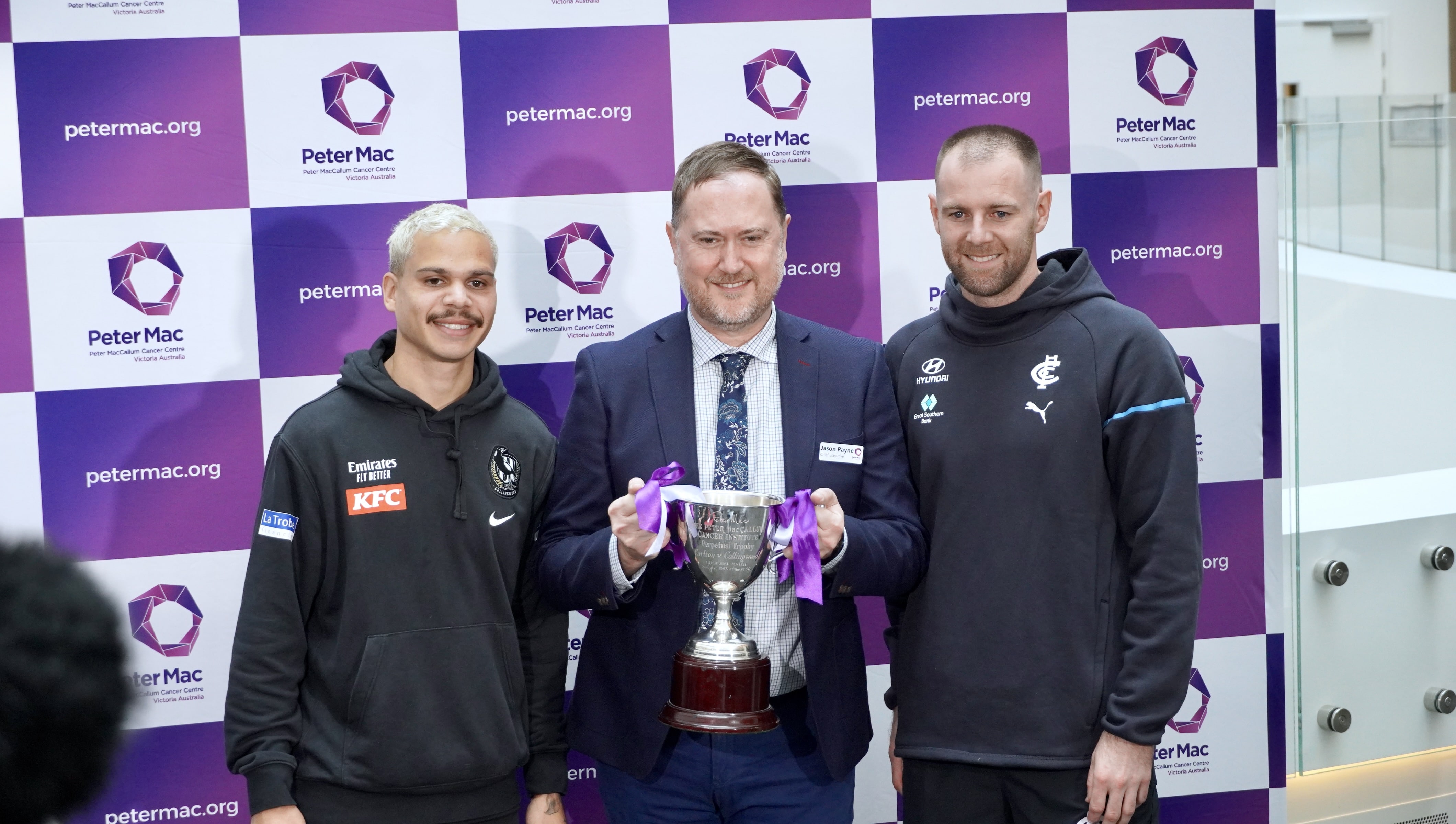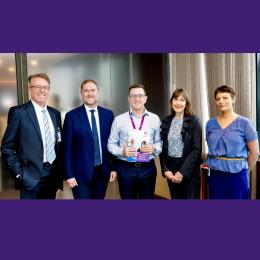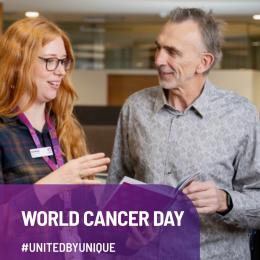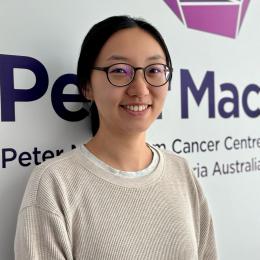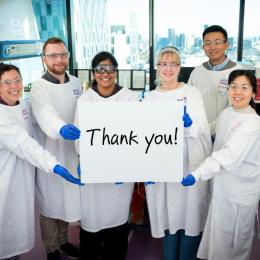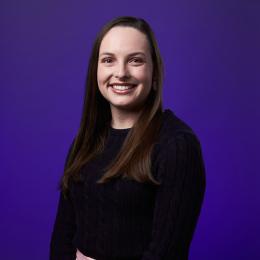Foundation funding drives melanoma research: Dr Aparna Rao
4 min read 03 April 2024
Medical oncologist Dr Aparna Rao opens up about why she’s made melanoma research her life’s work, and what receiving a Discovery Partner Fellowship from the Peter Mac Cancer Foundation will mean for people facing cancer.
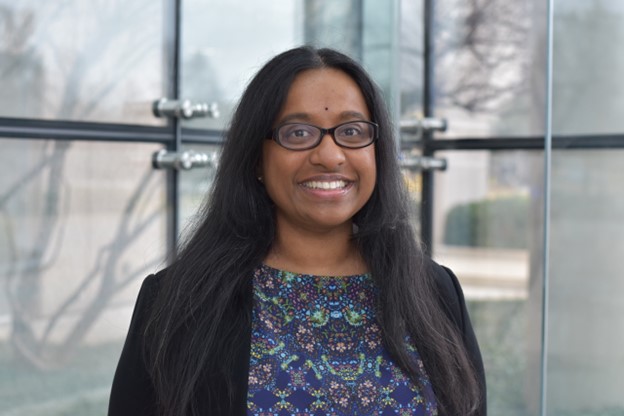
Peter Mac holds a special place in Dr Aparna Rao’s heart. “I think it's a place where extraordinary things happen every day,” she says.
Aparna first joined Peter Mac as a medical oncology fellow in 2012. Knowing she wanted to combine her clinical practice with a career in research, she undertook a PhD in the Grant McArthur Lab, which investigates treatment strategies for melanoma – the deadliest type of skin cancer.
Aparna went on to spend three years in the USA advancing her studies but has since brought her expertise home to Peter Mac.
Alongside caring for patients, Aparna leads a ground-breaking project called the ‘MetaMel’ study. Her research explores how melanoma tumours metabolise energy, and how this information can be harnessed to develop better therapies for patients.
“I see Peter Mac as the premier cancer hospital in Australia — it's very unique in being a hospital that is completely dedicated to the care of patients with cancer.”
“There are a lot of people working really hard in different ways to try and improve things for people with cancer.”
Aparna is now one of three promising clinical researchers awarded a Discovery Partner Fellowship, with the support of Peter Mac’s generous Discovery Partners (monthly givers).
The Fellowship provides clinical researchers with the funds and the time to get research off the ground or to continue crucial work on longer-term projects that aim to discover the next cancer breakthroughs.
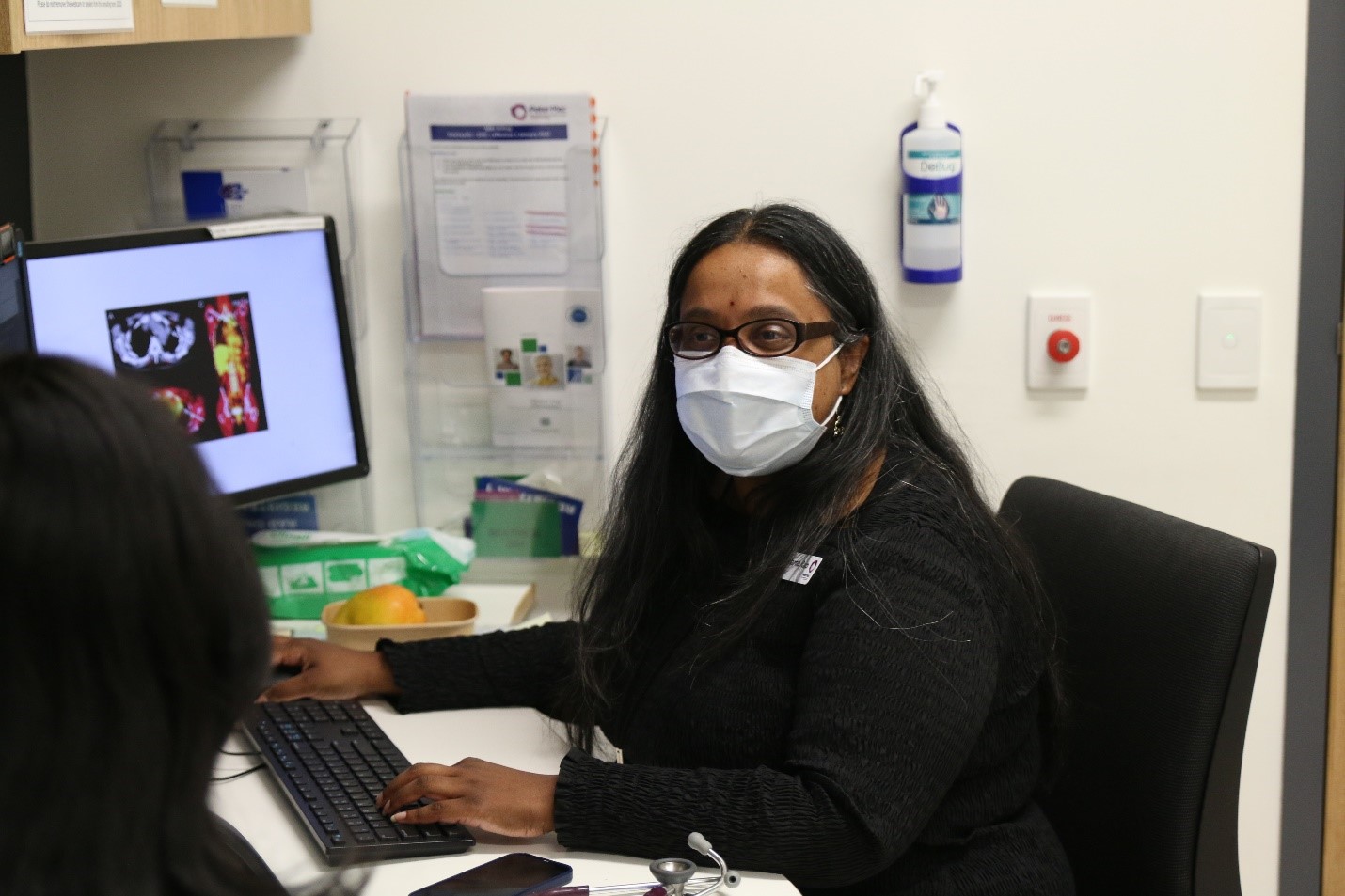 Alongside caring for patients, Dr Aparna Rao feels compelled to spend part of her life doing research
Alongside caring for patients, Dr Aparna Rao feels compelled to spend part of her life doing research
Unanswered questions
As a medical oncologist caring for people with advanced cancer, there are times when Aparna can’t answer the questions that are most important to her patients and their families.
“‘Why has this happened to me? Is this treatment likely to work? Are there any other treatments that could help me?’ To me, those are the basic questions that we should be able to answer," Aparna says.
“From the time I was in medical school, I was drawn to oncology as a specialty because I could see that we were entering an era where a deeper understanding of the things that make cancer ‘cancer’ was changing the way we look after patients.”
‘We’ve made many advances, but there are still so many unanswered questions in oncology,” she says.
“I feel compelled to spend some part of my life and career doing research alongside caring for patients so that I can try to find the answers to some of these questions.”
Now, with the help of the Discover Partner Fellowship, Aparna can dedicate more time to her research.
“It’s really important to continue to fund cancer research to help us understand cancer better. Without funding, you can’t make those explorations.”
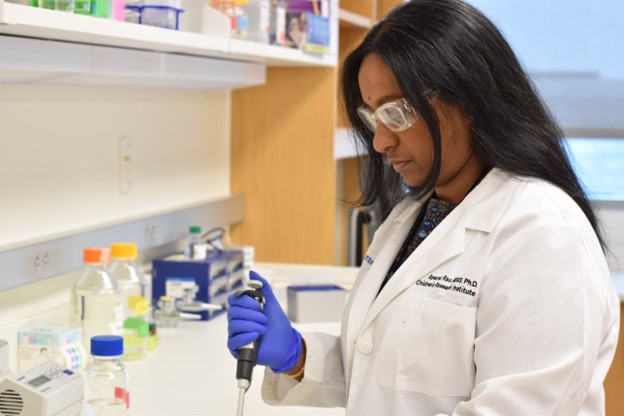 Aparna in the lab at UT Southwestern Medical Center in Dallas, USA, where she learned cutting-edge techniques she’s since brought back to Peter Mac
Aparna in the lab at UT Southwestern Medical Center in Dallas, USA, where she learned cutting-edge techniques she’s since brought back to Peter Mac
New treatments start in the lab
“For me, melanoma is one of the best examples of a cancer where, on a day-to-day basis, you can see how research has changed the way we look after patients.”
Aparna says drugs used in standard practice today were only beginning to be tested in clinical trials when she first came to Peter Mac.
“Now, if you use frontline combination immunotherapy, a bit over half of patients will have their disease controlled, or in some cases, completely gone for out to seven and a half years.
“I feel like I have had the privilege of actually seeing the impact of cancer research and the way it has completely changed the way we look after people — for the better.”
Receiving the Fellowship means Aparna can build on the pioneering work of Grant MacArthur’s lab. The research by Professor MacArthur and the team has been instrumental in understanding how signalling in cancer can be harnessed for targeted therapies and in using the body’s own immune system to fight cancer.
Through the ‘MetaMel’ study, Aparna is focused on understanding how tumours use fuels like glucose to grow.
Understanding how sugar is used by tumours
“At its simplest, the work I do is to really try and understand how cancer - in this case, melanoma - uses a particular fuel or nutrient to derive energy,” Aparna says.
“That might seem like a simple concept, but for many decades, all of that work was done in the laboratory with cancer cells and plastic dishes. The ‘MetaMel’ study is examining these things in patients themselves.”
Aparna will use cutting-edge techniques she learned while working at UT Southwestern Medical Center in Dallas, USA, to see how glucose interacts with a tumour in the body.
“What I'm so excited about is having the chance to bring to Peter Mac a technique I went to learn in the States.”
Patients are given a form of glucose or sugar a few hours before an operation, with blood and tumour samples then taken during the surgery. Aparna and her team then look at how glucose is absorbed by the melanoma and how it’s used through specific pathways to grow.
These new techniques will now allow researchers to accurately see how tumours use fuel in the body, helping to solve a missing piece of the puzzle.
 Aparna with Dr Jennifer Gill, a physician-scientist at UTSW and close collaborator on the MetaMel study, attending the Keystone Tumour Metabolism conference in Banff, Canada
Aparna with Dr Jennifer Gill, a physician-scientist at UTSW and close collaborator on the MetaMel study, attending the Keystone Tumour Metabolism conference in Banff, Canada
More targeted treatments
Aparna hopes this knowledge will lead to the development of biomarkers that will help identify which patients are at higher risk of relapse and those likely to resist conventional treatments.
“We can take that information and understand which tumours are most likely to respond to a certain treatment and which tumours are not. If there is an aspect of this process that helps us predict that, then we might be able to harness that to think about a therapy we could add in on top of it.”
Aparna’s ultimate goal is to find a pathway that could be used to target a tumour’s growth in combination with a treatment like immunotherapy. This breakthrough could provide more effective treatments for patients who relapse or who don’t respond to current therapies.
“That's kind of like the long-term goal — at the end of five years, maybe at the end of 10 years. Maybe at the end of my career. These are the things that I would hope we would find out from doing this kind of work.”
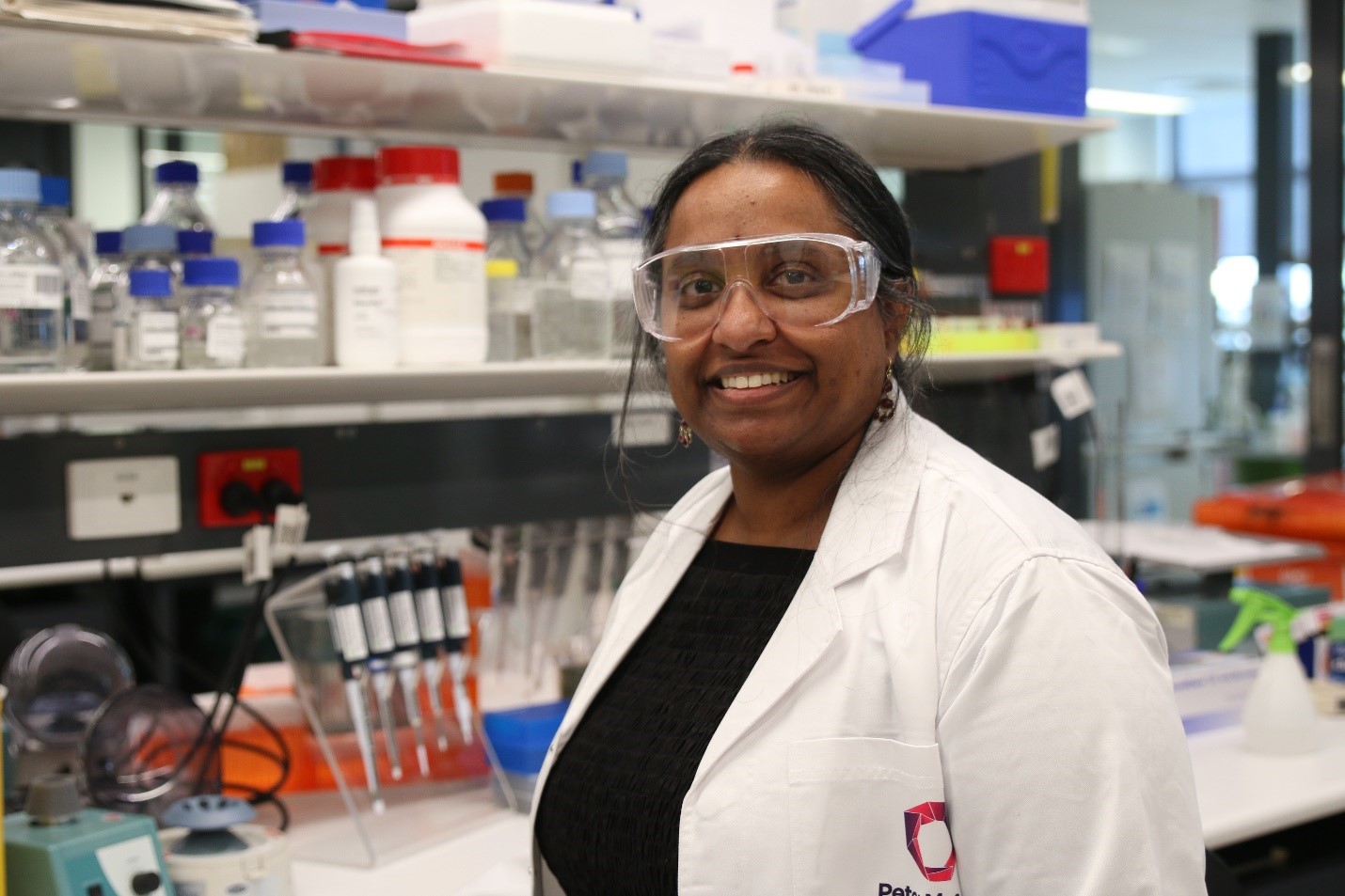 Aparna in the labs at Peter Mac
Aparna in the labs at Peter Mac
Importance of funding research
The generosity of donors has played a pivotal role in Aparna’s career.
In 2022, she received seed funding from Peter Mac’s Endowment Fund, which helped get ‘MetaMel’ off the ground.
“The Foundation has provided both pieces of the puzzle for this study - the initial funding for the study, and now some salary support for me to do the time. This has sustained the momentum for getting the whole project going.”
The continued support of Peter Mac donors through the Fellowship means Aparna now has long-term funding stability to realise her goals.
“Receiving this Discovery Partner Fellowship has opened up so much opportunity for me. The honest truth is it's life-changing."
"As important as it is to fund cancer research, there's a limited pool of funding in this country. It's extremely hard to get money to do this kind of work.”
“When you wear multiple hats – a clinical hat and a research hat – it becomes challenging to figure out the balance of those two things. If you do more clinical work, it comes with a salary. If you do research, it may not. So if you’re committed to doing research, you need support from somewhere.”
“It's really hard to encapsulate in words how grateful I am for the people who have donated money. I think those funds really allow people to get started on projects and to have the time or the resources to do work that otherwise might not be possible.”
The funds people have donated to Peter Mac have made a big difference across such a massive range of research projects at this institution.”
Our wonderful Discovery Partners make regular monthly donations to Peter Mac to fund life-changing research like Aparna’s.
By making a donation to the Peter MacCallum Cancer Foundation, you too can help other early or mid-career researchers like Aparna continue their vital work to discover kinder, more effective treatments for people affected by cancer.
Become a Discovery Partner to support cancer research like Aparna's
@Follow us on Instagram (@SupportPeterMac)

